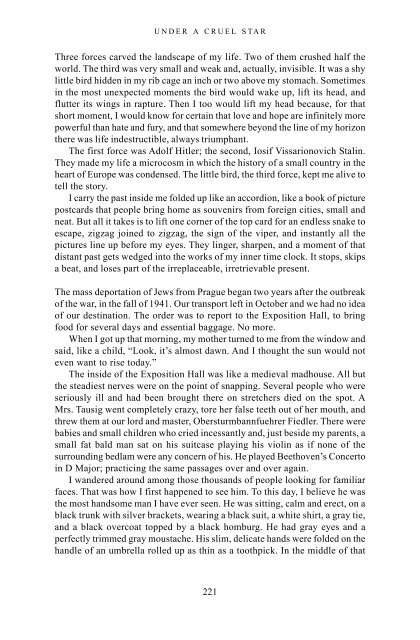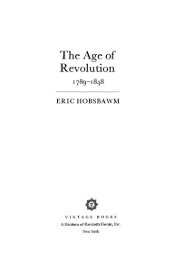The_Holokaust_-_origins,_implementation,_aftermath
The_Holokaust_-_origins,_implementation,_aftermath
The_Holokaust_-_origins,_implementation,_aftermath
Create successful ePaper yourself
Turn your PDF publications into a flip-book with our unique Google optimized e-Paper software.
UNDER A CRUEL STAR<br />
Three forces carved the landscape of my life. Two of them crushed half the<br />
world. <strong>The</strong> third was very small and weak and, actually, invisible. It was a shy<br />
little bird hidden in my rib cage an inch or two above my stomach. Sometimes<br />
in the most unexpected moments the bird would wake up, lift its head, and<br />
flutter its wings in rapture. <strong>The</strong>n I too would lift my head because, for that<br />
short moment, I would know for certain that love and hope are infinitely more<br />
powerful than hate and fury, and that somewhere beyond the line of my horizon<br />
there was life indestructible, always triumphant.<br />
<strong>The</strong> first force was Adolf Hitler; the second, Iosif Vissarionovich Stalin.<br />
<strong>The</strong>y made my life a microcosm in which the history of a small country in the<br />
heart of Europe was condensed. <strong>The</strong> little bird, the third force, kept me alive to<br />
tell the story.<br />
I carry the past inside me folded up like an accordion, like a book of picture<br />
postcards that people bring home as souvenirs from foreign cities, small and<br />
neat. But all it takes is to lift one corner of the top card for an endless snake to<br />
escape, zigzag joined to zigzag, the sign of the viper, and instantly all the<br />
pictures line up before my eyes. <strong>The</strong>y linger, sharpen, and a moment of that<br />
distant past gets wedged into the works of my inner time clock. It stops, skips<br />
a beat, and loses part of the irreplaceable, irretrievable present.<br />
<strong>The</strong> mass deportation of Jews from Prague began two years after the outbreak<br />
of the war, in the fall of 1941. Our transport left in October and we had no idea<br />
of our destination. <strong>The</strong> order was to report to the Exposition Hall, to bring<br />
food for several days and essential baggage. No more.<br />
When I got up that morning, my mother turned to me from the window and<br />
said, like a child, “Look, it’s almost dawn. And I thought the sun would not<br />
even want to rise today.”<br />
<strong>The</strong> inside of the Exposition Hall was like a medieval madhouse. All but<br />
the steadiest nerves were on the point of snapping. Several people who were<br />
seriously ill and had been brought there on stretchers died on the spot. A<br />
Mrs. Tausig went completely crazy, tore her false teeth out of her mouth, and<br />
threw them at our lord and master, Obersturmbannfuehrer Fiedler. <strong>The</strong>re were<br />
babies and small children who cried incessantly and, just beside my parents, a<br />
small fat bald man sat on his suitcase playing his violin as if none of the<br />
surrounding bedlam were any concern of his. He played Beethoven’s Concerto<br />
in D Major; practicing the same passages over and over again.<br />
I wandered around among those thousands of people looking for familiar<br />
faces. That was how I first happened to see him. To this day, I believe he was<br />
the most handsome man I have ever seen. He was sitting, calm and erect, on a<br />
black trunk with silver brackets, wearing a black suit, a white shirt, a gray tie,<br />
and a black overcoat topped by a black homburg. He had gray eyes and a<br />
perfectly trimmed gray moustache. His slim, delicate hands were folded on the<br />
handle of an umbrella rolled up as thin as a toothpick. In the middle of that<br />
221



